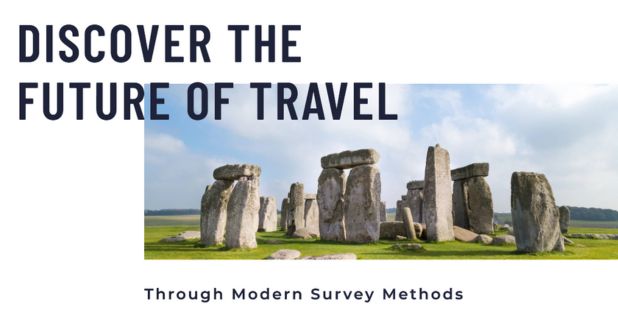Travel Surveys : A Window into the Future of Tourism

How Food Surveys Shape the Culinary Landscape
November 28, 2023
The Role of Healthcare Surveys in Improving Patient Care
December 10, 2023In an age where travel has become more accessible and diverse, understanding tourists’ shifting trends and preferences is crucial
for businesses and destinations seeking to thrive in the competitive tourism industry.
¬†This is where travel surveys come in, serving as a powerful tool that provides valuable insights into travelers’ evolving behaviors
and desires.
From the rise of sustainable tourism to the impact of technology on travel experiences, these surveys offer a fascinating glimpse
into the future direction of this dynamic sector.
By delving deep into the data gathered from these surveys, we can uncover what drives today’s travelers and gain invaluable
foresight into what will shape the landscape of tourism tomorrow. 
So, let’s embark on a journey through the lens of travel surveys, exploring how they serve as a window into the exciting future
awaiting the world of tourism.
What is a Travel Survey

Travel surveys provide a unique opportunity to gather valuable data and insights into the behaviors and preferences of travelers.
From modes of transportation to accommodation choices, these surveys offer a comprehensive look at the travel habits of
individuals, families, and groups.
By analyzing the information collected through these surveys, tourism industry professionals can understand emerging trends,
popular destinations and niche markets.
This wealth of data plays a pivotal role in shaping the future of tourism by informing marketing strategies, infrastructure
development, and overall destination management.
Moreover, travel surveys enable destinations to identify areas for improvement and innovation based on visitor feedback.
This feedback loop fosters a culture of continuous improvement within the tourism sector while ensuring that visitors’ needs are
met effectively.
 By engaging with travelers through surveys, destinations can better tailor their offerings to suit diverse demographics and create
more personalized experiences for their guests.
In essence, travel surveys serve as windows that open up new possibilities for enhancing traveler satisfaction and driving
sustainable growth within the tourism industry.
The Evolution of Travel Surveys
Travel surveys have come a long way since their inception, evolving from simple paper questionnaires to sophisticated online platforms.
With the advent of digital technology, travelers can now provide real-time feedback, enabling tourism organizations to make quick
and data-driven decisions.
The shift towards mobile surveys has also revolutionized how travel data is collected, allowing for greater convenience and
participation from a wider demographic of travelers.
Furthermore, the evolution of travel surveys has paved the way for more personalized and targeted marketing strategies within the
tourism industry.
By leveraging advanced survey analysis tools, businesses can gain deeper insights into traveler preferences and behavior,
ultimately leading to more tailored customer experiences
As travel survey methodologies continue to advance, we can expect an even more seamless integration of data analytics and
artificial intelligence, shaping the future of tourism in unprecedented ways.
Methods of Modern Travel Surveys

Modern travel surveys have revolutionized the way we understand tourist behavior and preferences.
-  Researchers can now gather real-time, accurate information on traveler movements and activities by utilizing advanced data collection methods such as GPS tracking, mobile apps, and social media analysis. This allows for a more holistic understanding of the travel experience, from planning to post-visit feedback.
- In addition to technological advancements, modern survey methodologies emphasize the importance of qualitative data alongside traditional quantitative metrics. Utilizing open-ended questions and ethnographic research techniques provides deeper insights into travelers’ motivations and emotions, offering a more nuanced understanding of their experiences.
-  Furthermore, incorporating machine learning algorithms and artificial intelligence enables researchers to uncover hidden patterns within the massive amounts of data collected, leading to more tailored tourism strategies and personalized customer experiences.
These innovative methodologies not only enhance the accuracy of travel surveys but also pave the way for a more sustainable and
inclusive future for the tourism industry.
Modern travel surveys have evolved significantly from traditional paper-based questionnaires to a more sophisticated approach
using digital technology.
Data collection methods now include online surveys, mobile apps, and even passive data collection through electronic toll systems
and location-based services.
This multi-channel approach allows for a more comprehensive and real-time collection of travel behavior and preferences,
providing a deeper understanding of traveler patterns.
Moreover, advanced analytics techniques such as machine learning and predictive modeling have enabled researchers to uncover
hidden patterns in the data, leading to more accurate predictions and insights into future travel trends.
The integration of big data has also revolutionized the analysis process, allowing for the examination of vast amounts of diverse
datasets to identify correlations and trends that were previously inaccessible.
With the help of geographic information systems (GIS), researchers can visualize spatial patterns related to travel behavior,
leading to better-informed decision-making in tourism planning and marketing strategies.
 Furthermore, social media sentiment analysis has emerged as a powerful tool for gauging traveler perceptions in real-time,
providing invaluable qualitative insights into customer satisfaction levels and identifying areas for improvement within the
tourism industry.
Insights from Recent Travel Surveys
Recent travel surveys have provided invaluable insights into tourists’ evolving preferences and behaviors.
- One striking trend is the increasing prioritization of sustainable and eco-friendly travel experiences. Travelers are becoming more conscious of their environmental impact. They are actively seeking destinations and accommodations that align with their values. This indicates a promising shift towards a more responsible approach to tourism, with travelers demanding transparency and accountability from hospitality providers.
- Another key takeaway from these surveys is the growing significance of personalized, immersive experiences in travel. Today’s tourists seek authentic interactions with local cultures, unique opportunities for exploration, and meaningful connections with their destinations. As a result, there is a rising demand for bespoke itineraries, off-the-beaten-path excursions, and engaging cultural exchange programs. This emphasis on personalization signals a departure from mass tourism towards tailored experiences that cater to individual interests and preferences.
Overall, these survey findings underscore the dynamic nature of the travel industry as it adapts to changing consumer attitudes and priorities.
¬†By recognizing and responding to these insights, tourism stakeholders can position themselves to meet travelers’ evolving needs
while contributing to the sustainable development of global tourism.
Impact of Travel Surveys on the Tourism Industry
Travel surveys play a crucial role in shaping the future of the tourism industry by providing invaluable insights into traveler
preferences, behaviors, and trends.
-  Tourism stakeholders can make informed decisions regarding destination marketing, infrastructure development, and customer experience enhancements by analyzing survey data.
- These surveys offer a window into the evolving needs of travelers, allowing businesses to tailor their offerings to meet changing demands.
- Furthermore, travel surveys enable destinations to identify emerging markets and niche segments that may have been previously overlooked.
- For instance, survey data can reveal a growing interest in sustainable travel practices or adventure tourism among specific demographics. This valuable information empowers the industry to diversify its offerings and tap into new sources of revenue while ensuring a more personalized and engaging experience for travelers.
- Ultimately, using travel surveys helps bridge the gap between tourist expectations and industry offerings. This leads to better-informed decision-making and more tailored experiences for travelers worldwide.
Case Studies
Let’s examine specific instances where travel surveys have significantly influenced tourism practices or policies.
- One specific instance where travel surveys have significantly influenced tourism practices is sustainable tourism. Surveys on traveler preferences and attitudes towards sustainability have prompted policymakers and industry stakeholders to implement ecotourism practices, reduce carbon footprint, and preserve natural habitats. For example, a survey conducted by a leading travel agency revealed that more than 70% of travelers were willing to pay extra for eco-friendly accommodations. This finding has increased global green certifications for hotels, resorts, and tour operators.
- Another impactful instance is using travel surveys to shape destination marketing strategies. By analyzing visitor feedback through surveys, tourism boards have been able to tailor their promotional campaigns toward specific demographics and interests. For instance, survey data might show that more travelers seek adventure activities or cultural immersion experiences. This information can then be used to create targeted advertising content highlighting these unique offerings, thus influencing tourism patterns and visitor behavior. The ability of travel surveys to directly impact marketing tactics demonstrates their crucial role in shaping future trends in the tourism industry.
The Future of Travel Surveys

As we enter the post-pandemic travel era, the importance of travel surveys has been elevated to new heights.
 These surveys are no longer just tools for understanding tourist preferences; they have now become a lens through which we can
envision the future of tourism.
With travelers seeking more personalized experiences and sustainable options, travel surveys will play a pivotal role in shaping the
industry’s trajectory.
 Businesses can gain valuable insights into emerging trends by analyzing data from these surveys, allowing them to tailor their
offerings to meet evolving consumer demands.
Additionally, travel surveys offer an opportunity to gauge public sentiment and concerns regarding safety, health protocols, and
ethical considerations.
As destinations strive to rebuild trust and attract tourists, understanding these sentiments will be crucial for crafting effective
marketing strategies and operational guidelines.
Furthermore, leveraging technology such as AI-driven analysis of survey responses can provide real-time feedback for businesses,
enabling them to adapt rapidly to changing circumstances in this dynamic landscape of modern travel.
In essence, travel surveys are not merely tools for measuring past behavior but a compass guiding us toward an exciting future of
transformative and sustainable tourism experiences.
Conclusion
In conclusion, travel surveys provide valuable insights into the future of tourism by identifying travelers’ trends, preferences, and
concerns.
These surveys offer a glimpse into tourists’ evolving needs and expectations, allowing businesses and destinations to adapt and
innovate accordingly.
 As technology continues to shape how people travel, leveraging survey data will be crucial in understanding and catering to the
changing dynamics of the tourism industry.
By embracing the findings from these surveys, stakeholders in the travel sector can better position themselves to meet the
demands of tomorrow’s travelers.
 Ultimately, investing in comprehensive travel surveys is an investment in creating more satisfying and sustainable tourism
experiences.



